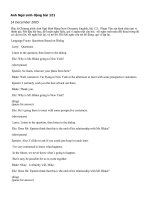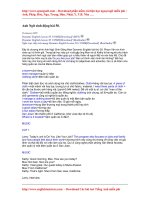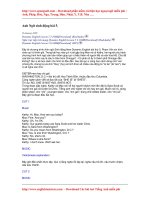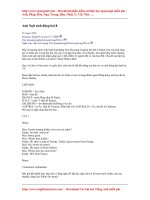Anh ngữ sinh động bài 146 pot
Bạn đang xem bản rút gọn của tài liệu. Xem và tải ngay bản đầy đủ của tài liệu tại đây (206.43 KB, 5 trang )
– Download phần mềm, tài liệu học ngoại ngữ miễn phí :
Anh, Pháp, Đức, Nga, Trung, Hàn, Nhật, Ý, T.B. Nha ….
– Download Các bài test Tiếng Anh miễn phí
Anh Ngữ Sinh Ðộng Bài 146
28/12/2006
Bấm vào đây để nghe
Nghe trực tiếp trên mạng Bấm vào đây để nghe
Bấm vào đây để tải xuống
Ðây là Chương Trình Anh Ngữ Sinh Ðộng New Dynamic English bài 146. Phạm Văn xin kính chào
quí vị thính giả. Bài học hôm nay có chủ đề là “Asking a Favor,” nhờ ai giúp chuyện gì đặc biệt—
asking someone to do something special for you. Ta nghe mẩu Ðàm thoại Thương Mại giữa Ms.
Palmer và Bill Martin, một đồng nghiệp của bà. A favor = làm ơn Do someone a favor = giúp đỡ ai
chuyện gì. Bà mẹ bà Palmer bị bịnh, bà phải lấy máy bay đi Miami hôm nay, mà ngày mai bà phải
họp với Ông Bob Myers của hãng Dover, Ltd. [Ltd.=Limited.] Bà gọi điện thoại tới nhà người bạn
đồng sở là ông Bill Martin nhờ Bill thay bà họ
p với ông Bob Meyers ngày mai. Bà nói: "Sorry to call
you at home" =xin lỗi phải gọi điện thoại ở nhà anh. I’ve got a problem= tôi có chuyện khó khăn phải
giải quyết. My mother is quite ill, and I have to fly to Miami today = Má tôi bị bịnh nặng, tôi phải lấy
máy bay đi Miami hôm nay.
Ill=sick=bị bịnh. Hate=ghét, ngại, không thích. I hate to ask, but… tôi rất ngần ngại phải xin nhờ
anh, nhưng…Would you mind meeting Bob Myers of Dover, Ltd. tomorrow? =xin anh cảm phiền
thay tôi gặp ông Myers thuộc công ty trách nhiện hữu hạn Dover ngày mai được không? I’ll be happy
to help out=tôi rất vui lòng được giúp chị. What time do you expect Mr. Myers to arrive? chị đoán
chừng nào Ông Myers sẽ tới? [To expect=mong đợi, nhưng trong câu này có ngh
ĩa như suppose,
presume, guess, đoán chừng.] I’d like to apologize for this inconvenience=tôi xin lỗi vì chuyện làm
phiền này. Don’t worry about it.= Xin chị đừng lo. I’ll take care of everything here.=Tôi sẽ lo mọi
chuyện ở sở. I certainly hope that your mother is feeling better.=Tôi hy vọng tình trạng của cụ khá
hơn.
CUT 1
Business Dialog: Asking a Favor
Larry: Business Dialog
Eliz: Let’s listen to today’s Business Dialog.
Ms. Palmer calls Bill Martin to ask a favor.
SFX: Telephone call
Martin: Hello.
Palmer: Hello, Bill. Sorry to call you at home.
Martin: No problem. What can I do for you?
Palmer: I’m afraid I’ve got a problem.
My mother is quite ill, and I have to fly to Miami today.
– Download phần mềm, tài liệu học ngoại ngữ miễn phí :
Anh, Pháp, Đức, Nga, Trung, Hàn, Nhật, Ý, T.B. Nha ….
– Download Các bài test Tiếng Anh miễn phí
I hate to ask, but would you mind meeting Bob Myers of Dover, Ltd. tomorrow?
Martin: I’m sorry to hear about your mother.
I’d be happy to help out.
What time do you expect Mr. Myers to arrive?
Palmer: He’ll be there at ten thirty.
Martin: Okay, I’ll meet him then.
Palmer: Thanks!
Again, I’d like to apologize for this inconvenience.
Martin: Don’t worry about it.
I’ll take care of everything here.
And I certainly hope your mother is feeling better.
Palmer: Thank you.
I hope I can be back by Wednesday, but I’m just not sure right now.
Martin: Sure, I understand.
Palmer: Thanks again. I appreciate it.
I’ll call you tomorrow afternoon around four o’clock.
Martin: Fine. I’ll talk with you then.
Vietnamese Explanation
Trong phần tới, ta nghe và lập lại bốn câu mẫu dùng khi nhờ ai một việc. Ðể ý đến những câu trong
tiến trình xin giúp của bà Palmer: 1. A starter: câu mở đầu: I’m afraid I’ve got a problem. 2. State the
problem (nói vấn đề khó khăn của mình): My mother is quite ill, and I have to fly to Miami today. 3.
Asking a favor (xin giúp): I hate to ask, but would you mind meeting Bob Myers of Dover, Ltd.
tomorrow? 4. Say thanks and apologies (cám ơn và xin lỗi): Again, I’d like to apologize for this
inconvenience. Xin nghe và lập lại.
CUT 2
Focus on Functions: Asking a favor
Larry: Focus on Functions: Asking a favor
Larry: Listen and Repeat.
– Download phần mềm, tài liệu học ngoại ngữ miễn phí :
Anh, Pháp, Đức, Nga, Trung, Hàn, Nhật, Ý, T.B. Nha ….
– Download Các bài test Tiếng Anh miễn phí
Eliz: What can I do for you?
(pause for repeat)
Eliz: I’m afraid I’ve got a problem.
(pause for repeat)
Eliz: I hate to ask, but
(pause for repeat)
Eliz: Would you mind meeting Bob Myers?
(pause for repeat)
Eliz: I’d be happy to help out.
(pause for repeat)
Eliz: I’d like to apologize for this inconvenience.
(pause for repeat)
Eliz: Don’t worry about it.
(pause for repeat)
Vietnamese Explanation
Trong phần Mách giúp Văn hoá, ta nghe Gary Engleton chỉ những bước trong một tiến trình nhờ
giúp. Ta đã học về những câu Ms. Palmer dùng: Sorry to call you at home. I’m afraid I’ve got a
problem. My mother is quite ill, and I have to fly to Miami today. I hate to ask, but would you mind
meeting Bob Myers of Dover, Ltd. tomorrow? Again, I’d like to apologize for this inconvenience.
CUT 3
Gary’s Tips: Asking a favor
Larry: Gary’s Tips.
Gary discusses asking a favor.
Eliz: Now it’s time for Gary’s Tips with Gary Engleton!
Gary: Hello, Elizabeth! Today I’ll be talking about asking a favor.
When you ask a favor, you usually include some form of apology, because you are asking someone to
do something special.
– Download phần mềm, tài liệu học ngoại ngữ miễn phí :
Anh, Pháp, Đức, Nga, Trung, Hàn, Nhật, Ý, T.B. Nha ….
– Download Các bài test Tiếng Anh miễn phí
In today’s Business Dialog, Ms. Palmer calls Bill Martin at home to ask a favor.
Before Ms. Palmer asks her favor, she apologizes for calling Bill at home, using the expression,
“Sorry.”
Bill accepts the apology by saying “No problem.”
Martin: Hello.
Palmer: Hello, Bill. Sorry to call you at home.
Martin: No problem. What can I do for you?
Palmer: I’m afraid I’ve got a problem.
Gary: When Ms. Palmer asks her favor, she uses very polite language, and includes the expression “I
hate to ask, but ”
Palmer: My mother is quite ill, and I have to fly to Miami today.
I hate to ask, but would you mind meeting Bob Myers of Dover, Ltd. tomorrow?
Martin: I’m sorry to hear about your mother.
I’d be happy to help out.
Gary: Bill shows that he understands and shares Ms. Palmer’s feelings when he says, “I’m sorry to
hear about your mother.”
In this case, “I’m sorry” is an expression of sympathy; it is not an apology.
Let’s listen again:
Palmer: I hate to ask, but would you mind meeting Bob Myers of Dover, Ltd. tomorrow?
Martin: I’m sorry to hear about your mother.
I’d be happy to help out.
Gary: The expression “I’d be happy to help out” is a good way to agree to do a favor for someone.
As the conversation continues, Ms. Palmer thanks Bill several times and again apologizes for the
trouble.
Palmer: Thanks!
Again, I’d like to apologize for this inconvenience.
Martin: Don’t worry about it.
– Download phần mềm, tài liệu học ngoại ngữ miễn phí :
Anh, Pháp, Đức, Nga, Trung, Hàn, Nhật, Ý, T.B. Nha ….
– Download Các bài test Tiếng Anh miễn phí
I’ll take care of everything here.
And I certainly hope your mother is feeling better.
Palmer: Thank you.
Gary: Bill uses the expression “Don’t worry about it” to reassure Ms. Palmer.
When you ask a favor, you will use several of the language functions we have been studying:
requesting, apologizing, and thanking.
Thanks for joining us today for Gary’s Tips.
Eliz: Thanks, Gary!
Vietnamese Explanation
Trong phần tới, ta ôn lại những câu chủ chốt cần khi nhờ ai việc gì. Nếu muốn nói,”Tôi rất ngại phải
hỏi bạn, nhưng tôi đang gặp một chuyện khó khăn,” quí-vị nói sao? I hate to ask you, but I’ve got a
problem. Nếu một người bạn nói,” My mother is quite ill,” thì quí-vị trả lời ra sao? I’m sorry to hear
about your mother. Nếu có người hỏi “Would you mind opening the window?” và quí-vị sẵn lòng giúp
mở cửa sổ, thì trả lời thế nào? Not at all. [hay Of course, not.]. Trong đoạn sắ
p tới, xin để ý đến
những câu lịch sự mà Ms. Palmer dùng như: Sorry to call you at home. Xin lỗi phải gọi điện thoại tại
nhà riêng của ông. I’m afraid I’ve got a problem…Tôi e rằng tôi gặp chuyện khó khăn…I hate to ask,
but would you mind…? Tôi rất ngại phải xin, nhưng ông có cảm phiền giúp không…Ta cũng để ý
những câu Bill Martin dùng: No problem. Không sao. What can I do for you? Tôi có thể giúp gì cho
chị? I’m sorry to hear about your mother. Tôi buồn nghe tin má chị bị bịnh. I’d be happy to help out.
Tôi rất vui lòng giúp chị. Don’t worry about it. Xin chị đừng lo. I’ll take care of everything here. Tôi
sẽ lo mọi chuyện ở sở cho chị. Xin nghe lại.
CUT 4
[same as cut 3]
Closing
Eliz: Well, our time is up. Tune in again next time for Functioning in Business. See you then!
Quí vị vừa học xong bài 146 trong Chương Trình Anh Ngữ Sinh Ðộng New Dynamic English. Phạm
Văn xin kính chào quí vị thính giả và xin hẹn gặp lại trong bài học kế tiếp.









